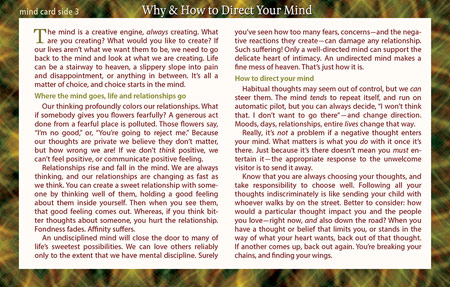Why and How to Direct Your Mind
The mind is a creative engine, always creating. What are you creating? What would you like to create? If our lives aren’t what we want them to be, we need to go back to the mind and look at what we are creating. Life can be a stairway to heaven, a slippery slope into pain and disappointment, or anything in between. It’s all a matter of choice, and choice starts in the mind.
Where the mind goes, life and relationships go
Our thinking profoundly colors our relationships. What if somebody gives you flowers fearfully? A generous act done from a fearful place is polluted. Those flowers say, “I’m no good,” or, “You’re going to reject me.” Because our thoughts are private we believe they don’t matter, but how wrong we are! If we don’t think positive, we can’t feel positive, or communicate positive feeling.
Relationships rise and fall in the mind. We are always thinking, and our relationships are changing as fast as we think. You can create a sweet relationship with someone by thinking well of them, holding a good feeling about them inside yourself. Then when you see them, that good feeling comes out. Whereas, if you think bitter thoughts about someone, you hurt the relationship. Fondness fades. Affinity suffers.
An undisciplined mind will close the door to many of life’s sweetest possibilities. We can love others reliably only to the extent that we have mental discipline. Surely you’ve seen how too many fears, concerns—and the negative reactions they create—can damage any relationship. Such suffering! Only a well-directed mind can support the delicate heart of intimacy. An undirected mind makes a fine mess of heaven. That’s just how it is.
How to direct your mind
Habitual thoughts may seem out of control, but we can steer them. The mind tends to repeat itself, and run on automatic pilot, but you can always decide, “I won’t think that. I don’t want to go there”—and change direction. Moods, days, relationships, entire lives change that way.
Really, it’s not a problem if a negative thought enters your mind. What matters is what you do with it once it’s there. Just because it’s there doesn’t mean you must entertain it—the appropriate response to the unwelcome visitor is to send it away.
Know that you are always choosing your thoughts, and take responsibility to choose well. Following all your thoughts indiscriminately is like sending your child with whoever walks by on the street. Better to consider: how would a particular thought impact you and the people you love—right now, and also down the road? When you have a thought or belief that limits you, or stands in the way of what your heart wants, back out of that thought. If another comes up, back out again. You’re breaking your chains, and finding your wings.

